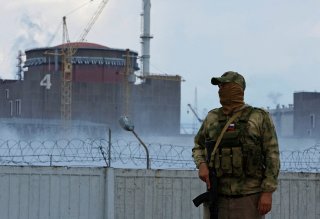The U.S. Can’t Lose the Global Nuclear Energy Race
The Biden administration has made the transition to clean energy a top strategic priority, but ignoring nuclear power cedes influence to Beijing and Moscow.
Moreover, in remarks at a Democratic National Committee fundraiser, Biden emphasized the need to get off of fossil fuels and lamented over “where we’d be right now if, in fact, Europe was in fact energy-free of fossil fuels and it was all renewables. It’d be a different world.”
This reflects the core of the president’s energy and climate intentions: to promote and deploy renewables to the front lines of the battle against climate change and establish energy security. This marginalization of nuclear power may reflect an ideological preference for renewables. If so, that ideological preference is blinding leaders and policymakers to the geopolitical consequences and national security implications of a global nuclear supply chain dominated by China and Russia.
The European energy security crisis that emerged in the wake of Russia’s invasion of Ukraine, along with the paucity of progress in recent COP efforts, has revived interest in nuclear power. However, Russia is the global leader in nuclear energy exports—a position that may erode in the aftermath of its war on Ukraine. Meanwhile, China has its own ambitions of becoming a dominant global partner in civilian nuclear technology. This provides an opportunity for the United States to form an allied nuclear partnership to divide these two competitors and weaken their combined geopolitical influence, while at the same time providing emerging economies with a non-authoritarian civilian nuclear partner who can work with them to escape energy poverty and bolster their energy security. Nuclear is the only technology that, on its own, can reduce carbon emissions, alleviate energy poverty, and counter China's and Russia's designs for dominating global energy partnerships.
Since the end of the Cold War, there has not been a more urgent need for the United States and its allies to leverage their greatest advantage over great power competitors—the power of alliances. America and its allies are battling issues on multiple fronts, and there is a critical need for strategic energy alliances that accept the reality that fossil fuels will be needed for the foreseeable future to meet energy poverty needs, rather than demonizing fossil fuels and objectifying carbon reduction as the single metric of success in global energy and climate diplomacy. This is especially true for natural gas. And recent progress with small modular reactors (SMR) and other advanced reactors provides an opportune moment for allies to coalesce around a long-term strategy for battling two long-term foes—energy poverty and China—with SMRs leading the way.
Recent energy and climate diplomacy by the United States and its allies through the UN and COP hasn’t been a collective failure because of a lack of ideals. These efforts failed because the dominant measure of success—carbon reduction—is incompatible with the world’s energy realities.
As such, Washington and its partners shouldn’t attempt to build a world order around carbon reduction. Rather, they should follow the example of the original authors of the rules-based international order and focus on accelerating economic development under low-carbon constraints, shoring up geopolitical stability, countering “socialism with Chinese characteristics,” and ensuring energy security through allied energy alliances. And on the front lines of these efforts, they should position allied nuclear partnerships to restore international leadership in civilian nuclear power to a U.S.-led coalition, displace Russia from its current position of civilian nuclear export dominance, and pre-empt China’s weaponization of energy resources and technologies and its ambitions to be the twenty-first-century’s steward of civilian nuclear.
David Gattie is an Associate Professor of Engineering at the University of Georgia’s (UGA) College of Engineering, and a Senior Fellow at UGA’s Center for International Trade and Security. He has provided testimony on energy, climate and nuclear power policy before the U.S. House Energy and Commerce Committee.
RDML (ret) Michael Hewitt, US Navy, is Co-Founder and CEO of IP3 Corporation and CEO of Allied Nuclear Partners. IP3 is the lead U.S. integrator for the development and operations of peaceful and secure civil nuclear power in the global marketplace. IP3’s vision is to create thriving, peaceful environments in critical world markets through the development of sustainable energy and security infrastructure via public/private initiatives and industry-led partnerships.
Image: Reuters.

